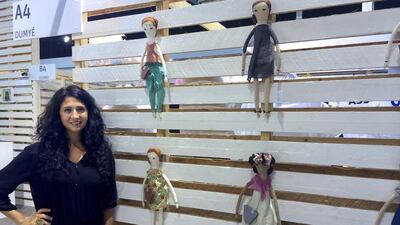What started out as a project to make a gift for her daughter has swiftly become an international business for Sahar Wahbeh, the founder of Dumyé and the winner of the Arabian Gulf final of The Venture.
Ms Wahbeh entered the global competition for social enterprise start-ups when she heard about it from a customer buying one of her company’s handcrafted rag dolls. After the brief conversation at Dubai-based Dumyé’s weekend market pop-up store, things moved swiftly. “Gathering all the information they wanted initially took a lot of time, while I was trying to keep everything concise and direct,” explains Ms Wahbeh, an American of Lebanese and Palestinian descent. “But after that, everything has happened really quickly. I’m so excited about winning; it could totally transform my business.”
The entrepreneur’s pitch at the final explained that a Dumyé doll is made with a social purpose. For each one bought, the company gives one away to an orphan, who gets to take part in an art workshop to decorate their own toy. Not only that, but the base dolls, which are gender-neutral so both boys and girls can play with them, are manufactured by a non-governmental organisation based in Uttar Pradesh, India.
“We commission an NGO to make blank dolls from fair trade organic cotton that is locally sourced,” says Ms Wahbeh. “The proceeds they make go towards educating the next generation of girls in their community, so it’s a nice full circle.”
It is an idea, a business and a story that struck a chord with the judges. In a matter of a few weeks, Ms Wahbeh’s company, which started out as one of about 25 entrants, passed through the last stage of The Venture, where five finalists were interviewed in depth, and took its place on the winner’s podium.
“We judged against specific criteria – social purpose, validity, practicality, scalability and credentials,” says David Freeborn, the regional managing director of the beverage dealer Pernod Ricard and one of The Venture’s judges. “As a project, while Dumyé appears quite simple, the social purpose side is actually quite complex. What you’re doing is putting manufacturing into an emerging area and then, based on that manufacturing, you are looking to support employment and further education.”
While the judges felt there was still work to be done on refining the presentation to make Dumyé ready for the global finals – which will be held in San Francisco this summer – they also believed that in Ms Wahbeh they would be working with an "entrepreneur who was coachable and open to feedback". Once in the United States, a week-long workshop will allow Dumyé and 16 other international finalists to meet, and learn from, leading tech companies. The entrepreneurs will also be mentored by experts and take a shot at securing a portion of the US$1 million in funding made available through The Venture. "We were looking for the project that has the most potential, the most scalability, one that is practical and viable, so what we can do is have a positive change when it comes to social enterprises," says Mr Freeborn.
It is new territory for those on both sides of the process. The Venture, first launched in October last year, not only demonstrates the growing strength of social enterprises in the Middle East, but also highlights the role of social media.
“One of the most interesting elements of the entry presentations is the ability to leverage social media,” says Mr Freeborn. “In a digital age, while we may be based in the UAE, the fact remains that we have a massive wider region here with a very young demographic. They are tech-savvy, social media-savvy and engaged, so if you get that element of your proposal right, then you have an opportunity for scalability – not just in the Mena region but beyond.”
This was a common thread among the finalists, three of whom, including the runner-up EdAid, had a strong technology element in their entries. The education company, which wants to use an internet-based crowdfunding platform to provide zero-interest higher education financing to students, has been operational for the past 12 months. “We’re connecting students who are looking to fund their education with investors and supporters willing to fund them,” says EdAid’s founder, Tom Woolf, 34, from the UK. “We built a working prototype – a closed beta – and were able to fund 100 students to prove the model “We’ve taken it back offline and we’re working six or seven days a week now to build a better platform and make it happen.”
business@thenational.ae
Follow The National's Business section on Twitter

